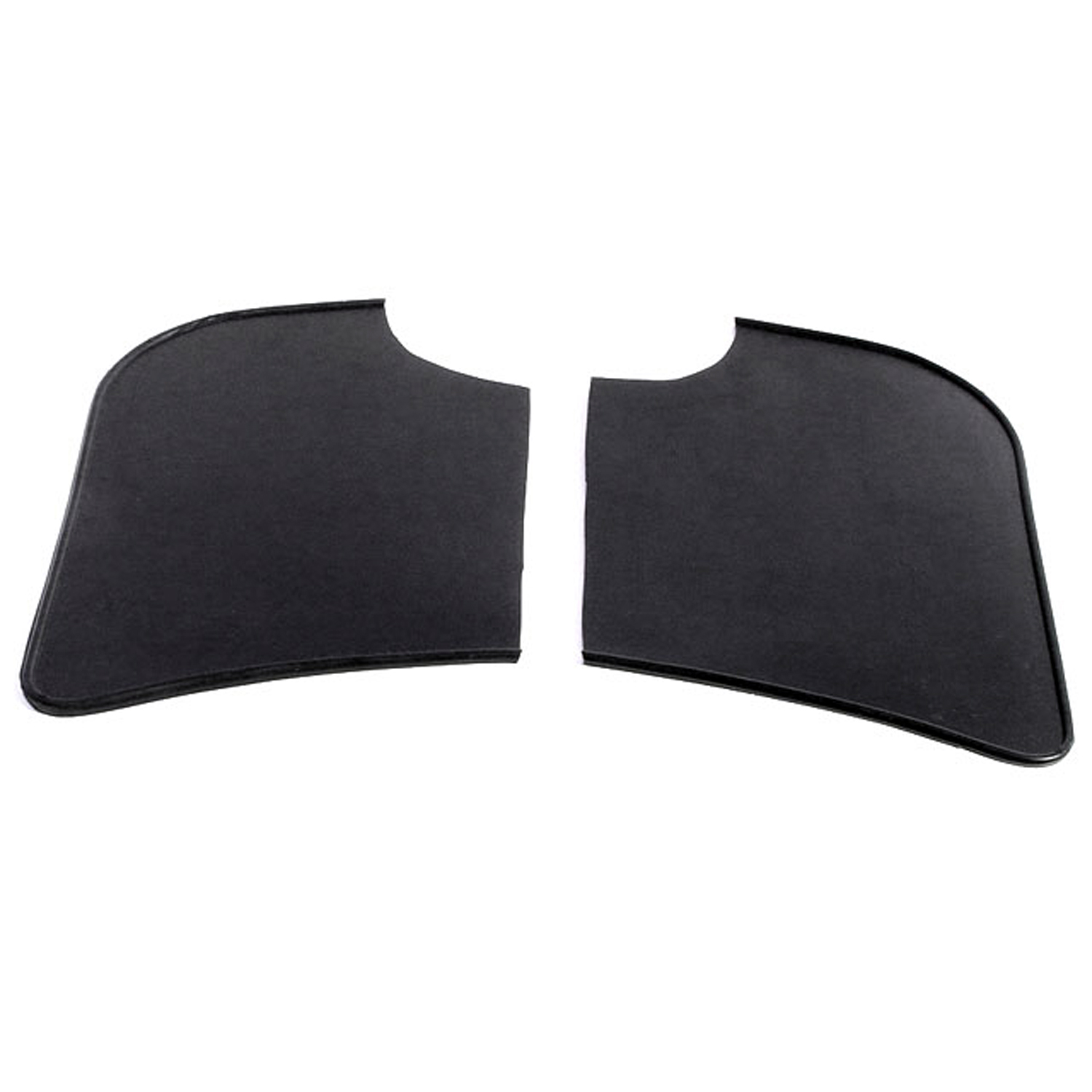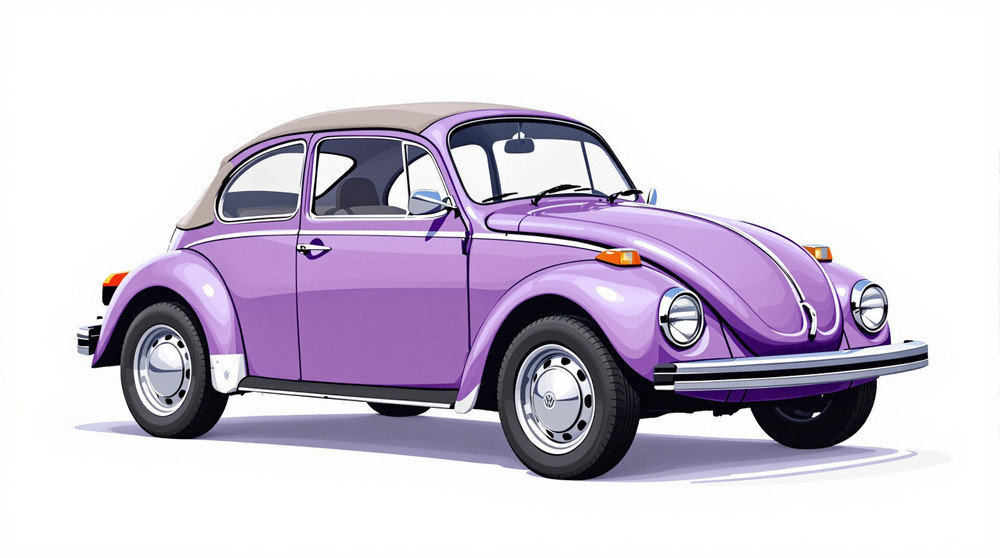Image of 1977 Volkswagen Beetle, Note: These illustrations use artistic license and may differ from actual historical models.
Performance Metrics
Fundamental Metrics
Emotional Appeal
MMP Rating
| Engine Specifications | |
|---|---|
| Engine: | 1.6L H4 |
| Displacement: | 1584cc |
| Horsepower: | 48-60 HP |
| Torque: | 73 lb-ft |
| Compression Ratio: | 7.5:1 |
| Ignition System: | Electronic Ignition |
| Cooling System: | Air-cooled |
| Performance Specifications | |
| 0-60 Time: | 18.6 seconds |
| 1/4 Mile Time: | 20.3 seconds |
| Top Speed: | 81 mph |
| Transmission and Drive | |
| Drive Type: | RWD (Rear Wheel Drive) |
| Transmission Type: | 4-speed manual |
| Fuel and Efficiency | |
| Fuel System Type: | Carburetor |
| MPG: | 25-28 MPG |
| Dimensions and Brakes | |
| Brakes: | Front disc and rear drum brakes |
| Wheelbase: | 94.5 inches |
| Weight: | 1,984 lbs |
Note: Specifications for classic cars are given to the best of our ability, considering the limited and variant data available.
1977 Volkswagen Beetle: A Timeless Icon of Automotive History
The 1977 Volkswagen Beetle is not just a car; it's a cultural icon that encapsulates the spirit of an era. Born from the innovative vision of Ferdinand Porsche and the economic needs of pre-war Germany, the Beetle emerged as a symbol of simplicity and reliability. Its unique design and affordability made it a global phenomenon, capturing hearts from Berlin to San Francisco. One intriguing fact about this enduring classic is that it was the first car to reach a production milestone of 20 million units, setting a benchmark for success in the automotive industry.
Design and Innovation
The exterior styling of the 1977 Beetle is instantly recognizable with its rounded silhouette, protruding fenders, and charismatic headlamps that seem to give it a face with personality. Inside, the cabin offers an unpretentious charm with durable materials designed to stand the test of time. Despite its modest roots, the '77 Beetle featured some technological advancements for its era, such as electronic fuel injection in some models. Color options ranged from vibrant hues like Mars Red and Sunshine Yellow to more subdued tones like Miami Blue, with brighter colors often being favored by enthusiasts. The most iconic body style remains the two-door sedan, which has become synonymous with the Beetle's image.
Historical Significance
The 1977 Volkswagen Beetle's impact on automotive design is undeniable. It challenged prevailing trends by proving that small, efficient cars could be immensely popular worldwide. Its air-cooled rear engine layout was unconventional but became one of its defining features. The Beetle's success paved the way for other compact cars and showed that there was significant demand for vehicles that prioritized practicality over luxury.
Performance and Handling
Performance-wise, the '77 Beetle wasn't built to break records with top speeds hovering around 80 mph and leisurely acceleration from 0-60 mph taking upwards of 17 seconds. However, it was never about speed; it was about dependability and handling daily driving with grace. The ride quality was firm yet comfortable, absorbing bumps adequately while providing an engaging driving experience. Behind the wheel, drivers enjoyed a tactile connection with the car, accompanied by the distinctive hum of its air-cooled engine.
Ownership Experience
The Volkswagen Beetle was many things to many people: an economical daily driver, a quirky show car, or even a platform for racing in modified forms. Its mechanical simplicity meant that maintenance could often be performed by owners themselves, contributing to its reputation for reliability. While certain parts may now be rarer than others, a robust community and aftermarket support continue to make ownership feasible.
Fun Facts
The '77 Beetle has been owned by celebrities and featured in countless films, adding to its pop culture legacy. It holds records for longevity in production and sales figures that few models can rival. Despite criticism over time for its lack of modern amenities or power compared to contemporaries, it remains beloved for its character and simplicity.
Collector's Information
Today's collectors might find a well-preserved 1977 Volkswagen Beetle valued anywhere from $5,000 to $15,000 depending on condition and originality. While exact production numbers for this specific year are hard to pin down in the context of its massive overall production run, Beetles from this era are relatively plentiful but are becoming more collectible as time goes on. As such, their value is generally appreciating slowly but steadily among classic car enthusiasts.
Conclusion
The 1977 Volkswagen Beetle stands as a testament to design longevity and universal appeal in the automotive world. Its story is one of triumph in simplicity and efficiency over extravagance—a narrative that continues to resonate with fans across generations. As we look back at this charming vehicle's journey through history, it's clear that the Beetle is much more than just a car; it's a cherished chapter in our collective cultural heritage.
1977 Volkswagen Beetle Catalog of Parts
 1977 Volkswagen Beetle Gravel Shields. Molded flat without metal backing plates-FS 40Gravel Shields. Molded flat without metal backing plates. Apply with contact cement. 7-5/8" long X 5-5/8" wide at top. Pair
1977 Volkswagen Beetle Gravel Shields. Molded flat without metal backing plates-FS 40Gravel Shields. Molded flat without metal backing plates. Apply with contact cement. 7-5/8" long X 5-5/8" wide at top. PairWhy Choose Metro?
For over 100 years, Metro Moulded Parts has been the pinnacle of quality in classic car restoration parts. Our commitment to precision and authenticity in every component ensures a perfect fit and an OEM-level appearance.
- Expert Craftsmanship & Quality: Each part is a testament to our dedication to reliability and perfection, crafted from original designs and thoroughly tested.
- Advanced Technology: We use cutting-edge techniques to create flawless, long-lasting parts that surpass others in performance.
- SuperSoft Sponge – The Ultimate Door Seal: Not only are our door seals 30% softer than competitors', but they're also guaranteed to never leak. They effectively reduce wind and road noise, enhancing your classic car's comfort and driving experience.
- Proudly American: Our parts are a product of American craftsmanship, made in the USA with a spirit of excellence and heritage.
- Unrivaled Warranty: We back our products with a 30-year industry-leading warranty, a testament to our confidence in their quality.
Join us in preserving the legacy of classic cars with parts that are crafted for perfection, not just made.

